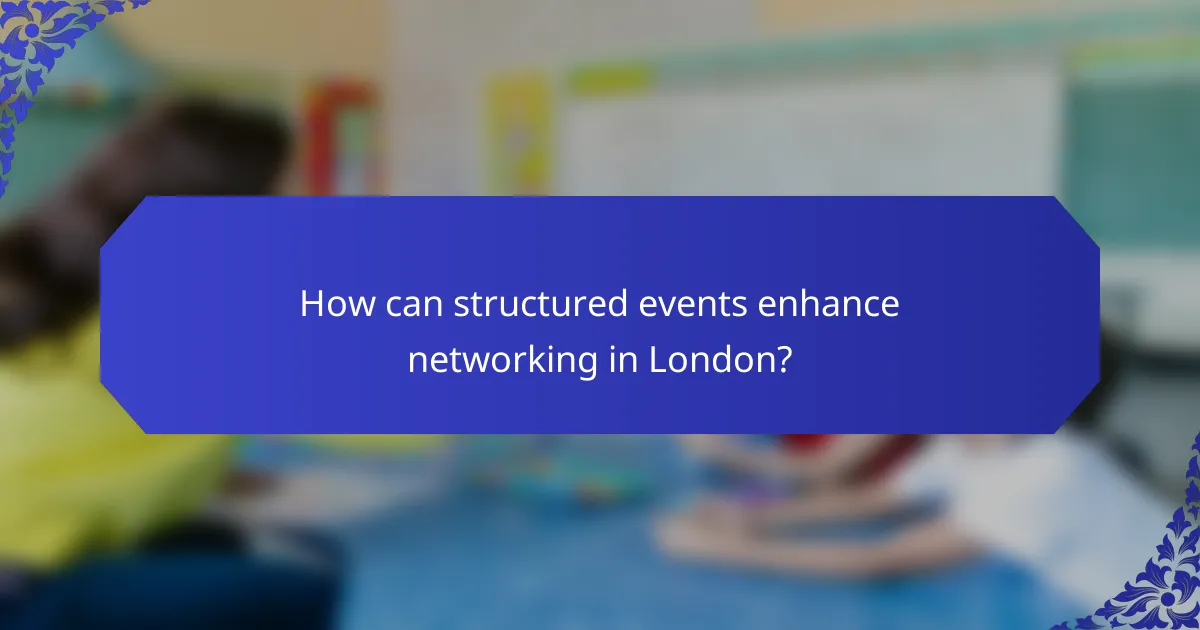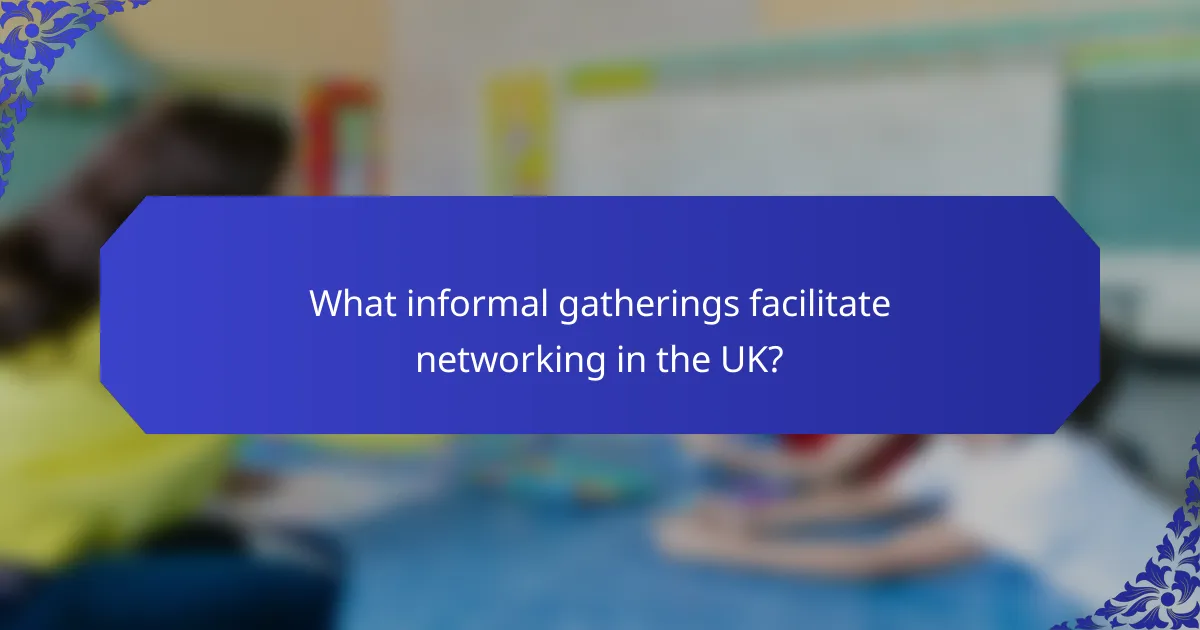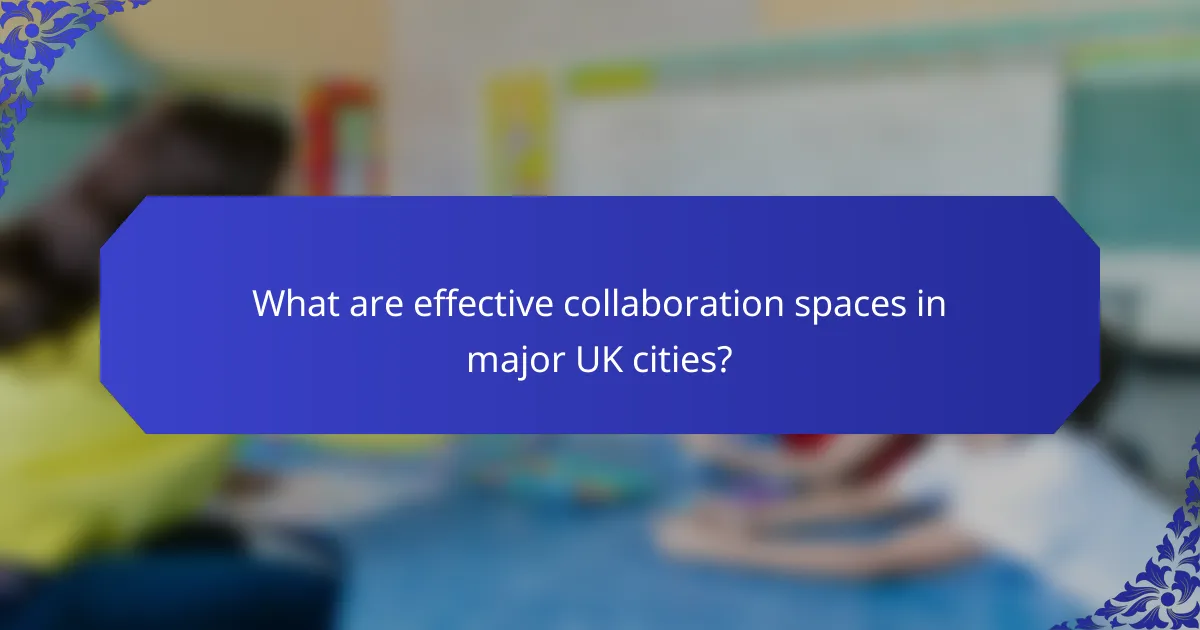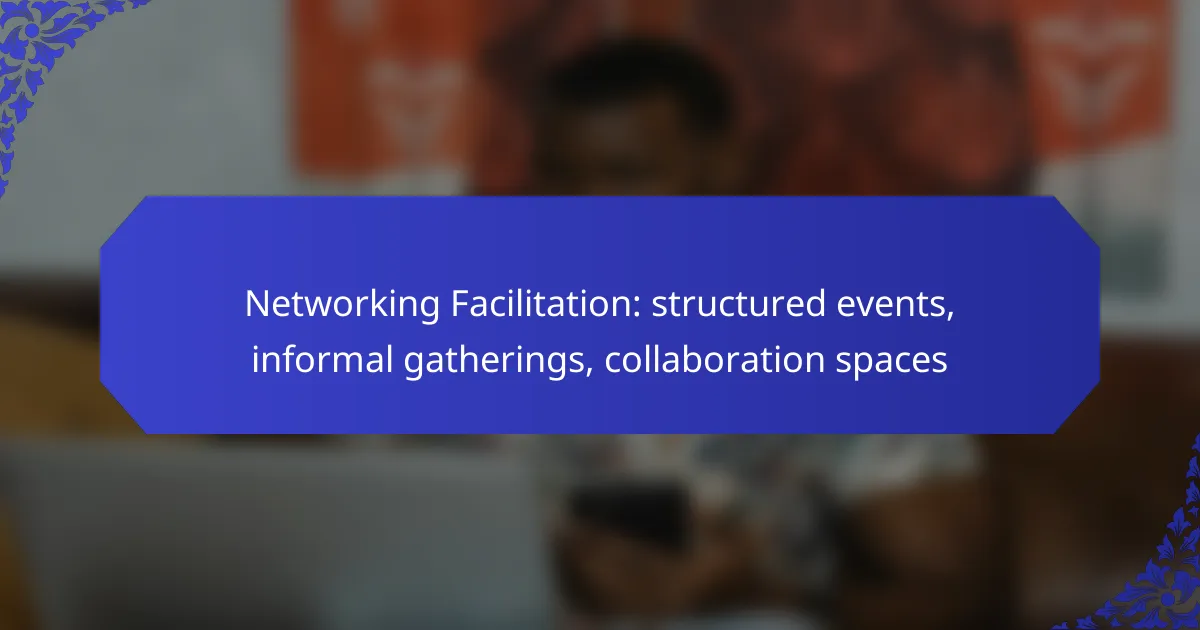Networking facilitation is essential for professionals seeking to build meaningful connections and collaborate effectively. Structured events offer focused environments for productive interactions, while informal gatherings create relaxed settings for sharing ideas. Additionally, collaboration spaces like co-working hubs and innovation centers provide dynamic opportunities for networking and creativity, catering to various professional needs.

How can structured events enhance networking in London?
Structured events in London can significantly enhance networking by providing focused environments where professionals can connect meaningfully. These events facilitate interactions that are often more productive than casual encounters, allowing attendees to build valuable relationships and exchange ideas effectively.
Formal networking events
Formal networking events are typically organized gatherings where attendees engage in structured interactions, often with a specific agenda. These events can include speed networking sessions, where participants have brief, timed conversations with multiple people, maximizing the number of connections made in a short period.
When attending formal networking events in London, prepare a concise elevator pitch about yourself and your work. This will help you introduce yourself effectively and leave a lasting impression on others.
Workshops and seminars
Workshops and seminars provide opportunities for learning while also facilitating networking among participants. These events often focus on specific skills or topics, allowing attendees to meet others with similar interests and goals.
Engage actively during discussions and group activities to foster connections. Sharing insights or asking questions can help you stand out and encourage others to approach you for further conversation.
Industry conferences
Industry conferences gather professionals from a specific field, offering a platform for networking, knowledge sharing, and collaboration. These events often feature keynote speakers, panel discussions, and breakout sessions that encourage interaction among attendees.
To make the most of an industry conference in London, set clear networking goals beforehand, such as meeting specific individuals or companies. Utilize conference apps or social media to connect with attendees before the event.
Networking dinners
Networking dinners combine a relaxed dining atmosphere with professional interaction, making it easier to build relationships. These events often include guest speakers or themed discussions that provide common ground for conversation.
When attending a networking dinner, focus on building rapport rather than just exchanging business cards. Engage in meaningful conversations and follow up with new contacts afterward to solidify connections.
Trade shows
Trade shows showcase products and services from various companies, providing a unique environment for networking. Attendees can meet industry leaders, explore innovations, and connect with potential partners or clients.
To effectively network at trade shows in London, plan your visit by identifying key exhibitors and sessions to attend. Bring plenty of business cards and be prepared to discuss your interests and how they align with the exhibitors’ offerings.

What informal gatherings facilitate networking in the UK?
Informal gatherings in the UK, such as meetups, coffee catch-ups, networking happy hours, and community events, play a crucial role in facilitating networking. These events provide relaxed environments where individuals can connect, share ideas, and build professional relationships without the pressure of formal settings.
Meetups and social gatherings
Meetups and social gatherings are organized events where people with similar interests come together to network and share experiences. These can range from industry-specific meetups to hobby-based groups, allowing participants to connect over shared passions.
Consider using platforms like Meetup.com to find or create events in your area. Aim for gatherings that encourage interaction, such as icebreaker activities or discussion panels, to maximize networking opportunities.
Coffee catch-ups
Coffee catch-ups are informal meetings typically held in cafes or co-working spaces, offering a relaxed setting for networking. These one-on-one or small group meetings allow for deeper conversations and relationship building.
To make the most of coffee catch-ups, prepare a few discussion points or questions in advance. Keep the atmosphere casual and be open to sharing your experiences while also listening to others.
Networking happy hours
Networking happy hours are social events held in bars or restaurants, often after work hours, where professionals can unwind and connect. These events typically feature drinks and light snacks, making them conducive to relaxed conversations.
When attending a networking happy hour, be proactive in introducing yourself and engaging with others. Set a goal to meet a certain number of new contacts and follow up with them afterward to solidify connections.
Community events
Community events, such as fairs, festivals, or local workshops, provide excellent networking opportunities by bringing together diverse groups of people. These events often focus on local issues or interests, fostering a sense of community and collaboration.
Participating in community events can enhance your visibility and help you connect with local professionals. Consider volunteering or hosting a booth to engage more actively and showcase your expertise.

What are effective collaboration spaces in major UK cities?
Effective collaboration spaces in major UK cities include co-working spaces, innovation hubs, business incubators, and creative studios. These environments foster networking, creativity, and productivity, catering to diverse professional needs and preferences.
Co-working spaces
Co-working spaces are shared work environments that provide flexible office solutions for freelancers, startups, and established businesses. They typically offer amenities like high-speed internet, meeting rooms, and communal areas, allowing professionals to collaborate and network.
In cities like London and Manchester, co-working spaces can range from budget-friendly options to premium facilities with additional services. Popular examples include WeWork and Spaces, which often host events to encourage community engagement.
Innovation hubs
Innovation hubs are dedicated spaces designed to foster creativity and technological advancement. They often bring together entrepreneurs, researchers, and industry experts to collaborate on new ideas and projects.
In the UK, innovation hubs like the Digital Catapult in London focus on emerging technologies and provide resources such as mentorship and funding opportunities. These hubs are ideal for those looking to develop cutting-edge solutions and connect with like-minded individuals.
Business incubators
Business incubators support early-stage startups by providing resources such as office space, mentorship, and access to funding. They aim to nurture businesses through their formative stages, helping them grow and succeed.
Incubators like Seedcamp and Techstars in the UK offer structured programs that include training and networking opportunities. Startups can benefit from the collaborative environment and shared knowledge, increasing their chances of success.
Creative studios
Creative studios are spaces designed for artists, designers, and other creatives to work and collaborate on projects. These studios often provide specialized equipment and resources tailored to various creative disciplines.
In cities like Bristol and Edinburgh, creative studios can range from photography and film studios to design and art spaces. They often host workshops and exhibitions, promoting collaboration and community engagement among creatives.

How to choose the right networking event for your goals?
Selecting the right networking event hinges on understanding your specific objectives and the type of connections you wish to make. Whether you’re seeking industry insights, potential collaborations, or job opportunities, aligning your goals with the event’s focus is crucial.
Identifying target audience
To effectively choose a networking event, first identify your target audience. Consider who you want to connect with—industry peers, potential clients, or thought leaders. Understanding their demographics, interests, and professional backgrounds will help you select an event that attracts the right participants.
For example, if you’re in tech, look for events that cater to software developers or IT professionals. This ensures that the conversations and connections you make are relevant and beneficial to your goals.
Evaluating event format
The format of a networking event can greatly influence its effectiveness. Consider whether the event is structured, such as a panel discussion or workshop, or informal, like a social gathering. Structured events often provide more focused discussions, while informal settings can foster more relaxed and organic interactions.
Additionally, think about the size of the event. Smaller gatherings may offer deeper connections, while larger conferences can provide a broader range of contacts. Assess your comfort level and networking style to choose the best fit for your needs.
